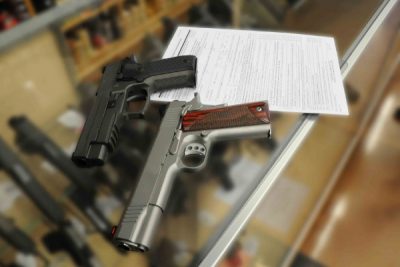
In the age of the Internet, three days is plenty of time for the FBI to conduct a background check. (Photo: FBI)
In what appears to be an effort to garner clicks in the wake of the Texas church shooting, USA Today published an “exclusive” article based on a seven-month-old public document from the FBI.
The document outlines the number of firearm retrieval requests the FBI sent to the ATF in 2016. While the 4,170 requests does represent a sharp rise since last year, as the Washington Free Beacon points out, it doesn’t indicate an overall increase in botched background checks for firearms purchases.
Kevin Johnson, the author of the USA Today article, uses his “exclusive” evidence in an attempt prove that the three-day waiting period does not give the FBI enough time to conduct a background check.
Under the current system, the FBI has three days to determine whether a potential firearm purchaser is permitted to own a firearm under federal law. If they fail to reach a conclusion within three business days, the sale can go forward.
But the FBI doesn’t stop the background check after the three-day waiting period. If they determine that the purchaser cannot legally own a firearm, they send a retrieval request to the ATF to seize the firearm from the purchaser.
Johnson notes that the FBI made 4,170 such requests last year, up from 2,892 in 2015. He argues that the rise in requests “highlight persistent problems in a system where analysts must complete background checks within three days of the proposed purchase.”
Johnson also includes a quote from former assistant FBI director Stephen Morris to emphasize the seriousness of the “problem.”
SEE ALSO: AG Jeff Sessions Orders FBI, ATF to Review NICS
“They [the FBI] are very aware of the inherent risk to law enforcement officers when they (seek) a firearm retrieval,” said Morris, who recently oversaw the bureau’s background check operation based in West Virginia. “They feel tremendous pressure to make a determination” within the three-day period.
But Johnson fails to mention that last year’s request number doesn’t depart from the historic average as much as he would have his readers believe.
- In 2012, the FBI made 3,722 requests.
- In 2013, they made 3,375.
- And In 2014, they made 2,511.
- In 2015, they made 2,892.
- In 2016 they made 4,170.
While last year’s number is the highest in the past five years, it isn’t a record. In 2000, the FBI made 5,056, the most it has ever made to date.
In the wake of the Texas church shooting and after Congress’s increased scrutiny of the NICS background check system, USA Today editors know that criticizing how firearms are purchased in the U.S. will generate clicks and views.
But, as with any biased reporting, they don’t tell the whole story.
In 2016 the FBI conducted 27,538,673 background checks for firearm purchases. Of those, 24,509,418 were given an immediate determination and 120,497 purchases were denied. The number of retrieval requests represents only .015 percent of the total number of background checks. Hardly evidence that the system is “broken.”
1 thing i wonder about,if so denial and they ask for the said arm back ,does the denied citizen get their money back?
the way our government acts any more id bet they seal the money up n hold it for evidence a way of stealing but a loophole.they speak of gun show loopholes and this 1is 1 also
The article fails to mention the Brady Act says the transfer can proceed if the there is a delay status after the 3rd day if no final determination is made. That doesn’t preclude the FFL from proceeding with the transfer either or a state law prescribes a longer wait. NICS is a database and it’s only as good as the information it accesses; crap in, crap out.
The issue is about information currency and accuracy and it’s well known that agencies, courts, governments, and mental health care providers are not reporting. So yes, if the there is a delay after day 3 and the FBI finds derogatory information the transferee is disqualified form possessing or receiving a firearm, than law requires the firearm be retrieved if the transfer was made.
The process is working, maybe not working well, but it is working.
I understand the dangers to a federal agents or LEOs coming to seize firearms. I would hope they would attempt to communicate why the seizure is necessary and give the person options to turn over the firearms to authorities in a civilized manner. The alternative is to conduct a raid in full combat gear and come crashing through doors and windows in swift and violent manner where potential for casualties just escalated exponentially.
We know there are also “Incorrect Denials”, so it is also very possible to get a late denial resulting in a Unjustified Retrieval. I’ve never been on either end of a actual Retrieval. Is the FFL directed to ask the buyer to return it? If not returned does ATF come knocking? With a Warrant for the purchase? Or do they take all firearms on the property?
These bad Denials take a long time to clear up and depending on your location, you may need to fight in Court to get your firearms back. These are a few more reasons to not keep all you eggs in one basket!